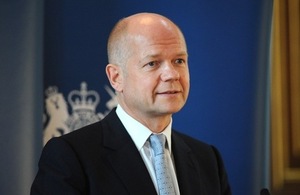Holy See: Working together to end sexual violence in conflict
Article by Foreign Secretary William Hague for L'Osservatore Romano publication "Women, Church, World". This is the full version in English

British Foreign Secretary William J Hague
In conflicts in nearly every corner of the globe, rape is used systematically and ruthlessly as a weapon of war. It destroys lives, causes physical and psychological trauma to the victims, undermines communities and adds to ethnic, sectarian and other divisions. Perpetrators are confident that they will not be prosecuted, and the majority of survivors never receive justice or support.
I have made preventing sexual violence in conflict central to UK foreign policy, which should always set out to improve the human condition as well as to deal with urgent crises. As a global community we reached agreement on an historic Arms Trade Treaty regulating the international trade in weapons. But rape and sexual violence are just as effective as bullets and tanks and their consequences as destructive. We have a choice. To work together again to grasp the growing political momentum to end sexual violence in conflict and shatter impunity, or to let the opportunity slip away and with it the hopes of survivors worldwide. I believe that we must do the former: now is the time to act to end the use of rape as a weapon of war.
There are no easy solutions. Tackling sexual violence is part of a much broader effort to address violence against women and girls and to empower women across society. I was delighted when in April 2013 G8 Member States adopted a historic Declaration on Preventing Sexual Violence in Conflict, in which G8 countries pledged to address the political and practical issues surrounding these crimes. We need such commitments to end the treatment of rape and sexual violence as a secondary issue, and to put women’s rights and participation front and centre in conflict resolution.
I am pleased the G8’s focus on this issue received such warm words of support from Pope Francis, who wrote to the Prime Minister that “a further sign of attention to the human person is the inclusion as one of the central themes on the (G8) agenda of the protection of women and children from sexual violence in conflict situations”. In a large number of countries churches and faith groups are supporting survivors and helping communities rebuild after the devastation of conflict. Faith communities can also be central to shifting the stigma of shame from the victims to the perpetrators of these acts.The Catholic Church, with its global network, plays an important role.
But these steps are only the beginning. This is an issue on which we need to speak with one voice. It must remain at the top of the international agenda until we see an end to these abhorrent crimes.
In order to end sexual violence in conflict, we need many more countries to join us and take political and practical action. The G8 was a powerful start and in June, under the UK Presidency of the UN Security Council, I chaired a debate on sexual violence. Over 40 countries co-sponsored the new Security Council Resolution. I am working closely with the UN Secretary-General’s Special Representative on Sexual Violence in Conflict to improve international co-operation and we hope together we can get as many countries as possible to publically commit to a high level statement and send a powerful message to survivors that we have not forgotten them.
As the United Kingdom, we have also already sent expert teams to work with a number of countries and civil society groups to help build their capacity. Since December 2012, we have worked in Bosnia-Herzegovina, Libya, Mali, the Democratic Republic of the Congo and on the Syrian Borders and we are developing projects in a number of other countries.
The Catholic Church has an influential voice and together we can challenge the culture of impunity and silence which has allowed others to hide behind arguments that sexual violence is an inevitable consequence of conflict. Our predecessors fought the slave trade, banned the use of torture and outlawed the use of chemical weapons. It is for our generation to consign the use of rape as a weapon of war to the history books.
“Women, Church, World” (Italian version)